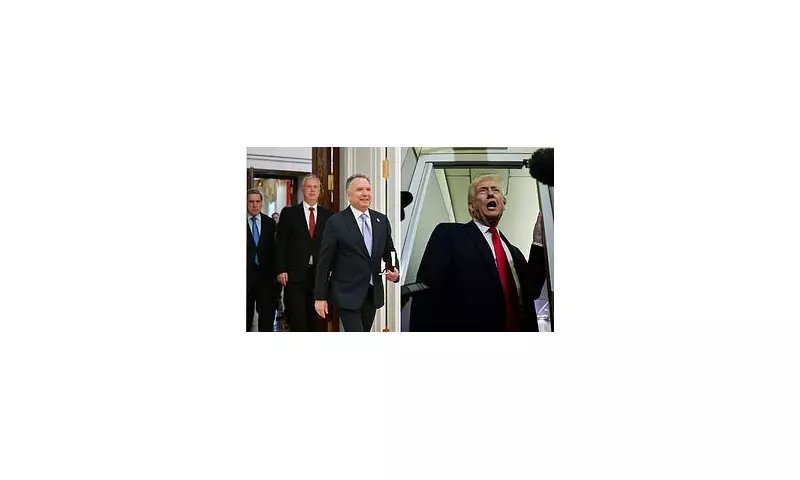
US Envoy's Controversial Kremlin Coaching Revealed
A leaked telephone conversation has exposed how America's special envoy instructed a senior Kremlin official on how Vladimir Putin should flatter Donald Trump and praise his Middle East peace agreement, in an apparent attempt to broker a ceasefire in Ukraine.
According to transcripts obtained by Bloomberg and verified by the White House, Steve Witkoff advised Putin's foreign policy adviser Yuri Ushakov that the Russian leader should personally telephone Trump to congratulate him on the Gaza ceasefire achievement.
During the October 14 call, Witkoff specifically suggested that Putin should "congratulate the president on this achievement, that you supported it, you supported it, that you respect that he is a man of peace and you're just, you're really glad to have seen it happen."
The American envoy assured his Russian counterpart that "from that, it's going to be a really good call" - advice that Ushakov readily accepted, responding: "Hey Steve, I agree with you that he will congratulate, he will say that Mr. Trump is a real peace man and so and so."
Modelling Ukraine Peace on Trump's Gaza Plan
The controversial exchange occurred just one day after Trump made a triumphant visit to Israel and Egypt celebrating the Gaza ceasefire agreement. The transcript further reveals that the White House intended to model the Ukraine-Russia peace deal directly on Trump's 28-point plan to end hostilities between Israel and Hamas.
Witkoff proposed during the call: "Maybe he says to President Trump: you know, Steve and Yuri discussed a very similar 20-point plan to peace and that could be something that we think might move the needle a little bit, we're open to those sorts of things."
The timing of the discussions has raised eyebrows, with the transcript showing that Witkoff suggested arranging a Trump-Putin conversation before Ukrainian President Volodymyr Zelensky's scheduled White House visit later that week. The American and Russian leaders ultimately spoke one day before Trump met with Zelensky on October 17.
Political Fallout and Accusations of Russian Favouritism
The leak has triggered significant political controversy, with accusations emerging that Witkoff demonstrates inappropriate favouritism toward Russian interests over Ukrainian sovereignty.
Republican Congressman Don Bacon, who has been critical of Trump's Ukraine approach, declared on X: "He cannot be trusted to lead these negotiations. Would a Russian paid agent do less than he? He should be fired."
Shortly after meeting with Zelensky, Trump publicly stated that Ukraine and Russia should "stop where they are" on the battlefield - effectively suggesting that Ukraine should concede territory currently occupied by Russian forces. The president told reporters: "You stop at the battle line, and both sides should go home, go to their families. Stop the killing. And that should be it. Stop right now at the battle line."
When questioned about why he believed the call was leaked, Ushakov suggested the publication was deliberately intended to undermine peace negotiations, stating: "To hinder, probably. It is unlikely this was done to improve relations."
Evolving Peace Plan and International Scrutiny
The White House has not disputed the transcript's authenticity, and Trump himself described Witkoff's approach as "standard" negotiating procedure, explaining: "He's got to sell this to Ukraine. He's got to sell Ukraine to Russia. That's what a dealmaker does."
However, the initial US framework for ending the war, first reported last week, prompted serious concerns that the Trump administration might pressure Ukraine into accepting a peace agreement heavily weighted toward Moscow. The original draft included provisions for Ukraine to cede the entire Donbas region to Russia, dramatically reduce its military size, and permanently rule out NATO membership.
Following significant pushback from Kyiv and European allies, the proposal has since been revised from 28 points to a 19-point peace plan that no longer includes amnesty guarantees for wartime atrocities. Instead of reducing military personnel from 900,000 to 600,000, Kyiv has agreed to cap its army at 800,000 troops.
The updated framework leaves the most sensitive issues - including territorial disputes and US security guarantees - for direct discussion between Trump and Zelensky. Russian Foreign Minister Sergei Lavrov has warned that if the plan "erased ... key understandings" reached during the Alaska summit in August, the situation would become "fundamentally different."
White House communications director Steven Cheung defended the administration's approach, stating: "This story proves one thing: Special Envoy Witkoff talks to officials in both Russia and Ukraine nearly every day to achieve peace, which is exactly what President Trump appointed him to do."
Meanwhile, Ushakov confirmed that Witkoff will travel to Moscow next week for further discussions, accompanied by "a number of other administration representatives who are involved in Ukrainian affairs." As diplomatic efforts intensify, all parties await to see whether these controversial revelations will ultimately advance or undermine the prospects for peace in Ukraine.





